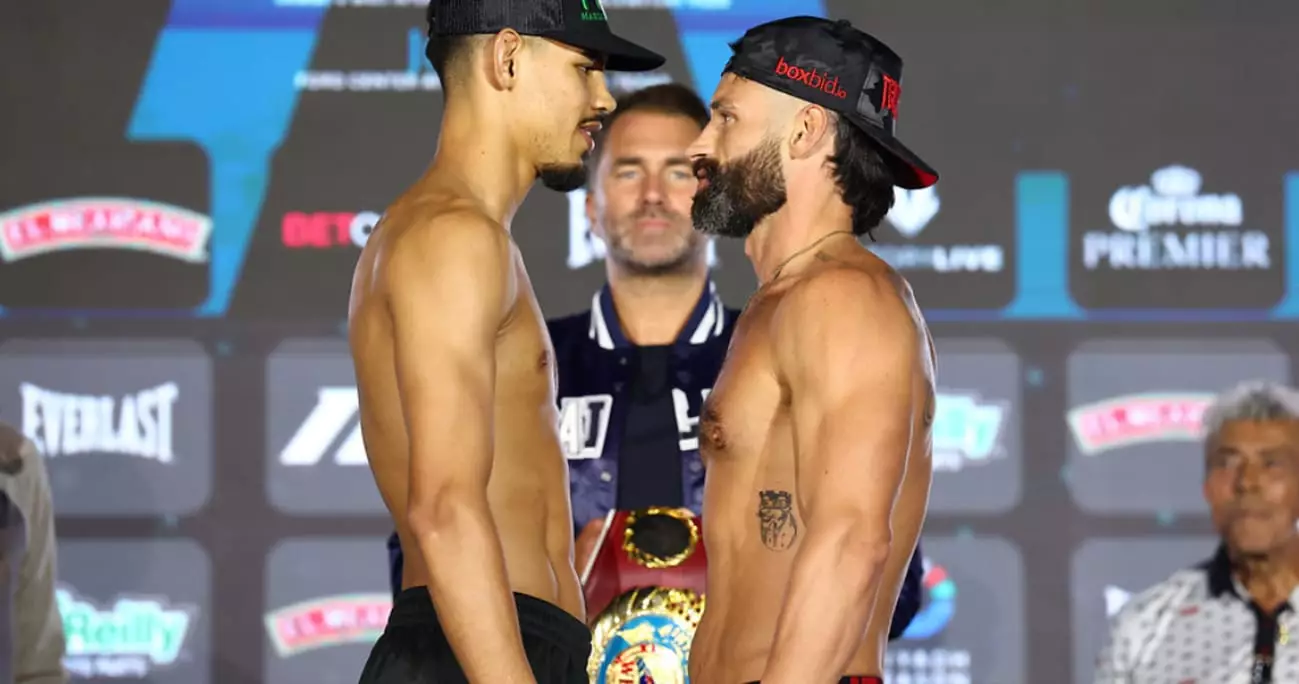The recent weigh-in of notable fighters like Diego Pacheco, Trevor McCumby, Jesse ‘Bam’ Rodriguez, and Phumelela Cafu revealed more than just their physical readiness—it underscored the psychological battlefield that precedes every match. Weigh-ins are often portrayed as mere formalities, but they are, in reality, a critical indicator of a fighter’s mental state and their approach to the upcoming fight. When fighters successfully make weight, it fosters a sense of confidence; however, the mental game is far more complex. For instance, Jesse Rodriguez’s composure and focus suggest a readiness that may or may not translate to victory. Conversely, the palpable tension and bravado amid the weigh-in process hint at underlying psychological strategies—some fighters attempt to intimidate, others to mask doubt. The weight class itself, especially in super middleweight, becomes a battleground of narratives, with fighters fighting not only each other but their own doubts and expectations.
The Myth of the Unbeatable Champion
Bam Rodriguez’s declaration of being a “generational great” demonstrates the kind of confidence that can serve as both armor and a double-edged sword. Such boasts, while inspiring and motivating, risk placing excessive pressure on the fighter. It’s easy to forget that in boxing, legends are often shaped through resilience and overcoming adversity—not inflated claims of greatness before the first punch is thrown. Rodriguez’s statement reveals a tendency among modern fighters to overestimate their invincibility. The reality is that no champion is truly unbeatable—every great has a chink in their armor. Cafu, known for his heavy punch, presents a real threat that might expose Rodriguez’s vulnerabilities. The mythologizing of young champions blinds audiences—and sometimes fighters themselves—to the brutal unpredictability of the sport. Overconfidence can lead to complacency, and in boxing, complacency is the fastest route to defeat.
The Audience’s Role: The Power of Support and Scrutiny
Fight nights, especially ones held in fighters’ home states like Texas, amplify the psychological stakes. Hype and fan support can bolster a fighter’s morale, but they can also create an environment of relentless scrutiny. A loss in front of hundreds or thousands of passionate fans can damage a young fighter’s confidence and marketability. Rodriguez’s home advantage is double-edged; the crowd’s energy can uplift him or serve as a relentless reminder of expectations. In contrast, Cafu’s heavy punching power makes this fight unpredictable regardless of home advantage. The spectators’ emotional investments shape the narrative, but they also add a dangerous layer of pressure. A loss here isn’t just a setback—it can tarnish a fighter’s reputation and diminish their aura of invincibility. This undue pressure often influences performance, revealing how much psychological stamina professional boxing demands beyond physical skill.
Challenging the Notion of “Greatness”
Eddie Hearn’s praise for Jesse Rodriguez as a potential “generational great” underscores a broader tendency in modern boxing to prematurely crown champions. While recognition is deserved for young talent, the romanticized idea of rapid ascension often glosses over the harsh realities some fighters face. The likely scenario is that Rodriguez might meet an opponent like Cafu, whose punch power and confidence could be too much for him. The immediate future of Rodriguez’s career depends heavily on how he handles setbacks—an aspect many fans and promoters tend to overlook. The expectation that he will ascend to multiple divisional titles, akin to winning in four or five different weight classes, is an ambitious leap—one that ignores the gritty, incremental process sports demand. Challenging established champions like Inoue or Nakatani isn’t just about skill; it’s about resilience, adaptability, and the willingness to face risks head-on. The ambition of young fighters should be tempered with realism, and their careers need time to evolve without the weight of premature legends being thrust upon them.
The Reality of Boxing: Expectations versus the Unpredictable Game
The narrative around fighters like Rodriguez often leans heavily into heroism and destiny. Yet, boxing is a brutal contest of attrition, where even the most talented can be subdued by a single punch or strategic mistake. Cafu’s reputation as a formidable puncher, and his confidence going into this bout, reminds us that in boxing, the fight’s outcome hinges on a moment of vulnerability. Rodriguez’s fans, and even the fighters themselves, must grapple with the understanding that loss is an inherent part of the sport. The hype of a major fight can create an illusion of certainty, but in reality, no fighter’s trajectory is guaranteed. The fight tonight isn’t just about who is technically better; it’s about who can withstand the psychological and physical storms of combat. The sport’s true essence lies in its unpredictability, and expecting fighters to fulfill lofty expectations without recognizing this fact is a disservice to the spirit of boxing.
The raw dynamism of boxing lies in its capacity to humble even the most hyped contenders. It’s a brutal or beautiful process—sometimes both at once—and critics must recognize that no champion is destined for greatness without enduring failure. While the narratives and personalities captivate audiences, the sport ultimately demands humility, resilience, and a relentless pursuit of improvement.

